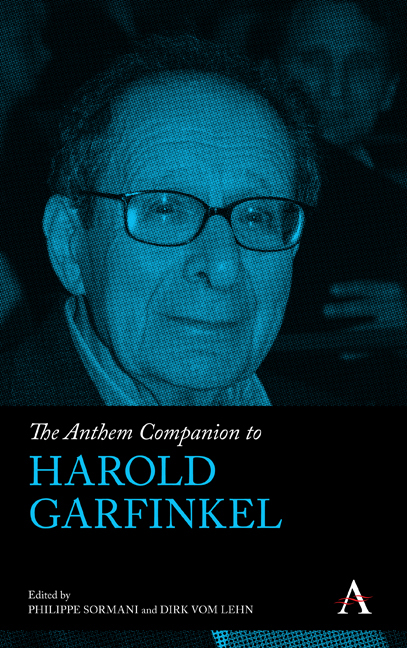Book contents
- Frontmatter
- Contents
- List of Illustrations
- Introduction: Rediscovering Garfinkel's “Experiments,” Renewing Ethnomethodological Inquiry
- Part I Exegesis
- Part II ‘Experiments’
- Part III Implications
- Postface: “Experiments”—What are we Talking About? A Plea for Conceptual Investigations
- Notes on Contributors
- Index of Names
- Index of Subjects
Chapter Three - Lay and Professional Competencies: Linking Garfinkel's Tutorial Exercises to a Study of Legal Work
Published online by Cambridge University Press: 28 February 2024
- Frontmatter
- Contents
- List of Illustrations
- Introduction: Rediscovering Garfinkel's “Experiments,” Renewing Ethnomethodological Inquiry
- Part I Exegesis
- Part II ‘Experiments’
- Part III Implications
- Postface: “Experiments”—What are we Talking About? A Plea for Conceptual Investigations
- Notes on Contributors
- Index of Names
- Index of Subjects
Summary
Introduction
Garfinkel's early breaching experiments, exercises and demonstrations provided the tools, materials and “instructed actions” for students and scholars to encounter and examine firsthand a then unexplored domain of phenomena. His distinctive pedagogy served as a prod to the “sluggish imaginations” of novices who were being introduced to ethnomethodology (EM) for the first time (Garfinkel 1967, 38). Such indigenous, hands-on work helped students “find and demonstrate a new phenomenon” of naturally organized activities and “elucidate[d] the lived orderliness of ordinary organizational things” (Garfinkel 1981, 2). This chapter suggests a connection between Garfinkel's early experiments, exercises and demonstrations and where EM is today. Like an intellectual archeology, I look back at early EM and consider how it laid the foundation for later EM “studies of work” in the professions and sciences, which also focus on the study-able domain of activities as properties of a local production. The chapter links Garfinkel's tutorial exercises, experiments and demonstrations to a “study of work” in the law and explores the continuities between technical legal reasoning/expert activities and commonsense reasoning/nonexpert activities as “instructably observable structures of practical action and practical reason” (Garfinkel 1996, 3).
The first part of the chapter discusses Garfinkel's breaching experiments and other early EM exercises and demonstrations that offer a “perspective by incongruity” on the otherwise seen-but-unnoticed features of social order and make visible and discoverable the locally organized detail of practical action in ordinary settings. The second part of the chapter presents what Garfinkel would term a “hybrid study of work” and examines an episode of courtroom cross-examination conducted by a highly competent trial lawyer engaged in the practical tasks of his profession as he attempts to impeach the testimony of a key witness in the famous O. J. Simpson murder case. I also discuss the practical work of the lay witness in response as he struggles to provide and sustain an unimpeachable account of what happened. Like Garfinkel's breaching experiments, the cross-examining attorney seeks to make trouble for the adverse witness, who attempts to hold his ground, and in so doing each makes study-able and accountable their respective practical action and practical reasoning.
- Type
- Chapter
- Information
- The Anthem Companion to Harold Garfinkel , pp. 45 - 62Publisher: Anthem PressPrint publication year: 2023



